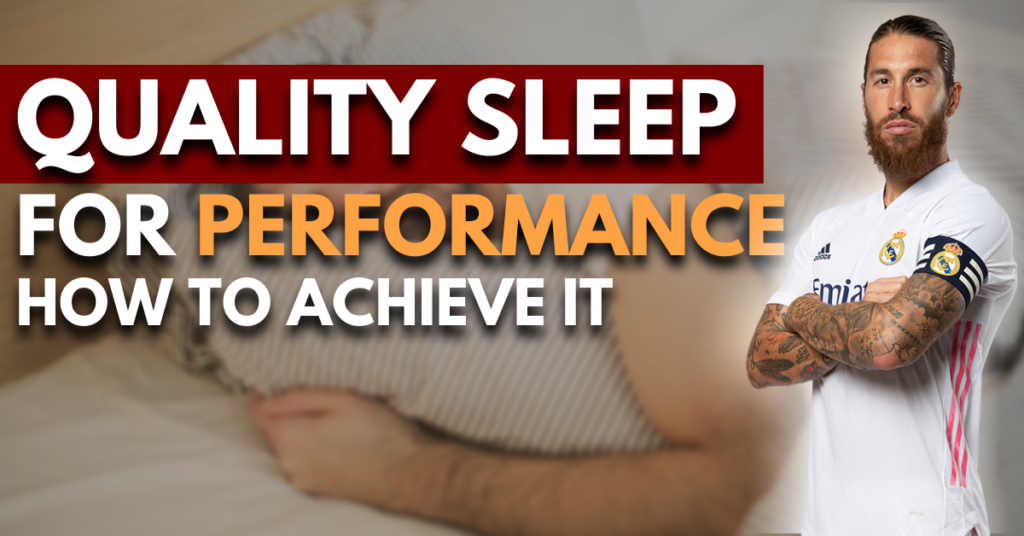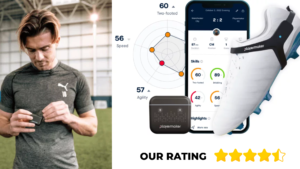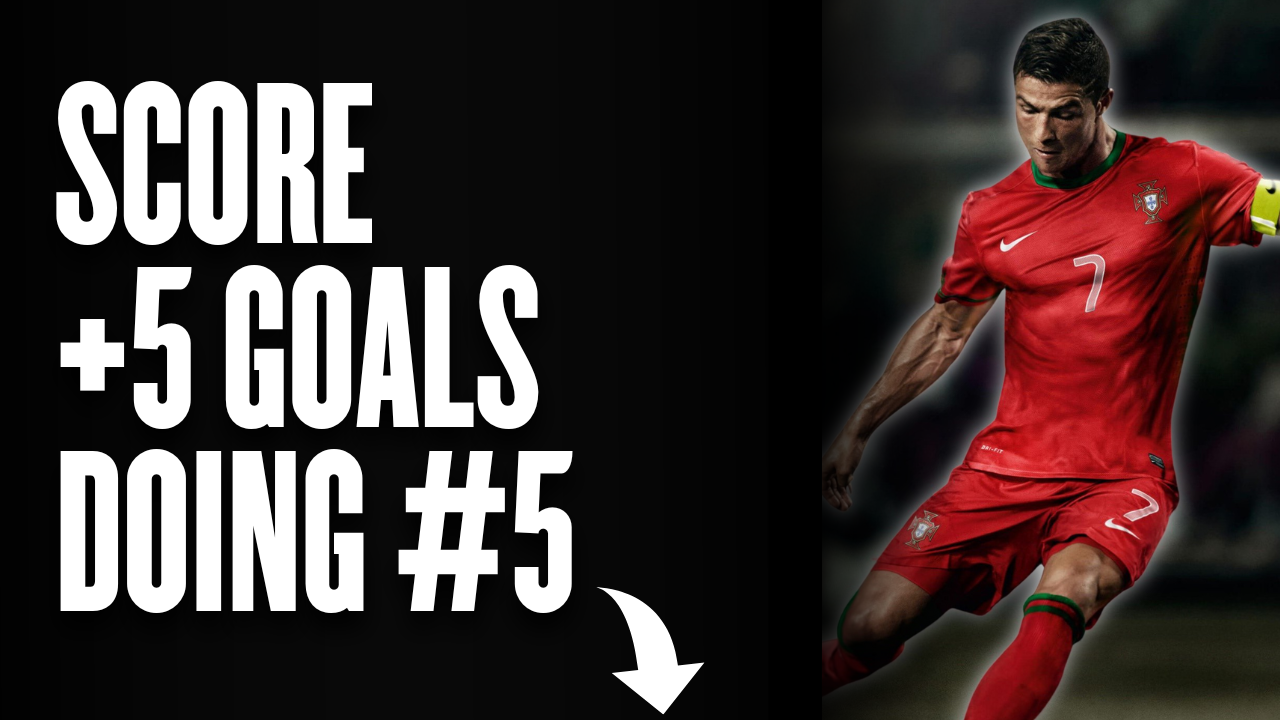
Quality sleep is a fundamental tool for maximizing performance and recovery. Unfortunately, many athletes often experience various types of sleeping disorders (sleep deprivation, interrupted sleeping patterns, insomnia, etc.), that directly affect their training and match-day performance as well as their ability to recover after strenuous activities.
In this article, we will analyze some basic ways so that you, the modern football player, can achieve quality sleep.
SLEEP QUANTITY & CIRCADIAN RHYTHM
One of the most important quality factors of your sleep is the duration of it (quantity). You should, first of all, create at least an 8-hour window each night that is dedicated to your sleep. Anything less than that can transform you into a sleep-deprived athlete.
If this equals sleeping early to wake up early, then do it. It’s not a sacrifice. It’s a necessity. If you can even increase the duration of your sleep to 9 hours, you’ll have created an ideal sleeping situation.
Anything over the 10-hour mark is considered extreme and would also cause some negative side effects, like drowsiness and lethargy.
The Circadian Rhythm
Having said that, we also need to point out the importance of keeping a stable sleep-wakeup cycle. This essentially means that you should strive to sleep and wake up at almost the same times each and every day.
Our body has an internal biological clock, known as our Circadian Rhythm, that operates on a 24-hour basis according to our general habits. This clock gets disturbed whenever our sleep-wakeup cycle changes. As a result, sleep latency might increase and the overall quality of our sleep can dramatically decrease (sleep interruptions, difficulty to wake up, etc.)
UNINTERRUPTED & DEEP SLEEP
Another important sleep quality factor is the continuity of our sleep during the night. Ensuring an uninterrupted sleep is key to reaching deeper sleeping stages. Our aim should be to reach the deepest sleeping stage, known as REM sleep (Rapid Eye Movement) or otherwise known as paradoxical sleep, This is usually the stage during which the individual dreams.
Achieving this stage of sleep during the night has many positive effects on the overall psychology and mood of the person during the day.
FUN FACT! Your brain and your whole body actually work faster during the REM sleep stage. Your heart rate increases, your eyes are moving faster, and your brain processes information it received during the day. That’s why it’s also called the paradox sleeping stage.
Of course, in order to achieve uninterrupted sleep, we must follow some basic protocols. These will not only contribute to the achievement of the above goal but more generally to the purpose of the quality of our sleep.
THE 10-3-2-1 METHOD
Caffeine & Sleep Quality
Caffeine is a performance enhancing stimulant that is widely being used in the sports community. Some of the benefits of caffeine for performance include increased cognitive skills, awareness, an overall feeling of energy, etc. Let’s leave this topic for another article though.
So, a chemical called adenosine is one of the many regulating factors of sleep. The function of adenosine is interfered with by caffeine, preventing the individual from following his/her regular sleeping schedule. Symptoms of caffeine overdose or poorly timed caffeine consumption can lead to sleep latency and/or poor quality of sleep [1].

*As an affiliate, I'm earning from qualifying purchases without any extra charges being placed on you.
Here’s how caffeine works.
Understandably, the need to adjust caffeine intake and timing it according to your sleeping habits is essential.
Caffeine usually takes about 8 to 10 hours to completely leave your bloodstream. So, if we want to minimize the effects of caffeine on the quality of your sleep, we need to regulate its use during the day.
- Your daily caffeine intake shouldn’t be above the recommended daily dose (3-6mg per Kilogram of Bodyweight = 200-400mg) [4]
- The last caffeine intake should be at most 8 to 10 hours before our bedtime.
Digestion & Sleep Quality
Digestion is another biological factor that affects the quality of sleep. The whole process of digestion can reach a 24 hours, however, the first 2-3 hours after a meal tend to be the most energy-consuming stages, keeping your whole body at a high work-rate.
If this small period of digestion is close or interferes with our sleep, it can cause major decreases in sleep quality. Therefore, what we need to do is make sure to consume our last meal about 2 to 3 hours before bedtime, thus giving our body valuable time to complete this energy-consuming digestion stage.
Exercise & Sleep Quality
Exercise is closely linked to the release of various hormones, such as adrenaline, dopamine, testosterone, etc. that make you feel more energetic, cheerful, and aware. It also raises your heart rate and body temperature. All of these effects significantly affect the overall duration and quality of an athlete’s sleep when sleep follows training [2].
It takes some time, usually close to 2 hours, for these changes to return to normal levels (rest levels).
Blue Light – The Enemy Of Sleep Quality
In addition to the adenosine we mentioned above, there is a hormone that is also responsible for causing sleepiness, known as melatonin. Just as caffeine inhibited the action of adenosine, so blue light blocks the action of melatonin.
For those of you who do not know, blue light is all around us; from the screen of our smartphones and laptops to the blue sky. This light is associated with an increase in our awareness as well as with the inhibition of melatonin production. Thus, although during the day it helps us to be more energetic and awake, at night it negatively affects our ability to sleep immediately and with quality.
For this reason it is advisable to avoid your exposure to blue light at the end of the day, i.e. 1 to 2 hours close to bedtime. You can achieve this through a variety of applications that are available in all app stores. Just type in “blue light filter” and download whichever app you like.
Hint: your laptop or phone might already have a blue light filter already downloaded. Search for it in the settings of your device.
ADDITIONAL TIPS
Chamomile Tea
Chamomile tea is one of the most ancient herbs known and it is widely used as part of the treatment process of various sleeping disorders. It’s effectiveness is widely known. Even studies promote it’s use for individuals who have a hard time falling asleep and staying in line with their sleeping habits, suggesting that it has hypnotic-like effects. [3]

*As an affiliate, I'm earning from qualifying purchases without any extra charges being placed on you.
Overall, chamomile tea, just like any other herbal tea (that doesn’t contain caffeine) can have calming effects that can help the individual fall asleep faster and smoother.
Long Walks & Light Exercise
Walking is another great practice that can help you bring up your sleeping quality. Going for a nice walk outside, breathing fresh air, and of course staying away from any kind of powerful light (smartphones included!) Can help you relax and prepare yourself for a good night’s sleep.
An amazing way to relieve your body and mind from all the stressors they had to experience during the day! A 10 to 30 minute walk is advisable. It can also be combined with a series of other activities, like listening to some chilly music, a podcast, an audio-book, or even with some mobility exercises, foam rolling, or breathing exercises, which we will analyze below.
Optimizing Your Sleeping Environment
Your sleeping environment is the A&O of a quality sleep. It includes everything from your mattress and pillows to your curtains and noise cancellation. Here are some tips to optimize that environment;
- Comfortable, ergonomic mattress and pillows
- Appropriate room temperature (neither too hot, nor too cold)
- Blacked-out room (no lights coming in, blacked-out curtains, sleep masks, etc.)
- Stay as far away from noises as possible
Breathing Exercises
Breathing exercises are an excellent way to really calm down your body and mind, reducing any tension and anxiety you might be feeling as well as bring down your heart rate.
Try it out and invest about 10 minutes every night for the next 15 days, practicing a basic breathing exercise. Here are some that will definitely help you!
- 4-7-8 (4 seconds inhale – 7 seconds hold on top – 8 seconds exhale)
- 4-8 (4 seconds inhale – 8 seconds exhale)
- 4-4-4 (4 seconds inhale – 4 seconds hold – 4 seconds exhale)
- Just inhale and exhale deeply and slowly
Make sure all your breaths are diaphragmatic, meaning that the oxygen you’re inducing is going all the way down to your stomach (your belly should be rising as you inhale). Generally, try inhaling from the nose and exhaling from the mouth. Focus on your breathing pattern and relax.
Letting Go Of Your Thoughts – Journaling
Many times, footballers feel overwhelmed by various problems they face in their daily lives that burden them psychologically. Pressure from the environment, reduced playing time, failure, the uncertainty of one’s career, etc. are all factors that can affect a footballer’s sleep.
The best piece of advice we could give you is to work with a specialist from the sports psychology and/or performance mentality field. If this is not available to you, we would advise you to start journaling. Essentially you keep a record of all the emotions and thoughts that plague your mind with a pen and paper.
In other words, you let go of your thoughts, allowing yourself to feel calmer and fall asleep faster.
Supplementation
In recent years, many people, among them athletes, have resorted to supplements for the sleep disorders they face. One method that many athletes use when they have difficulty falling asleep quickly is to take a melatonin supplement.
Melatonin, as mentioned above, is a hormone that is responsible for creating a feeling of sleepiness. By taking a melatonin supplement, you are essentially guiding your body in the direction of sleep, by increasing the existence of this hormone.
Such supplements are available in various forms (pills, sprays, chewing gum, powder, liquid, etc.) in every pharmacy and supplement store. If you have problems with your sleep, consult your pharmacist and doctor about the possible prescription of such melatonin supplements.
THE TAKEAWAY
In summary, we would say that the quantity and quality of your sleep depend on many factors. In this article, we analyzed various ways in which you can optimize your sleeping habits for performance and recovery. We would say that all the data we analyzed are generally classified from most to least important.
In other words, before resorting to melatonin supplementation practices or going out for a walk, make sure your sleep has a good duration (at least 8 hours) and then make sure that all the details are taken care of properly. From the intake of caffeine to the temperature of your room.
Quality sleep is the absolute ally of good performance and recovery. By optimizing your sleep you’re upgrading your whole game. Aim for consistency, day in day out, and trust me, you will not regret it.
Stop wasting time here and there and invest it in your sleep.




